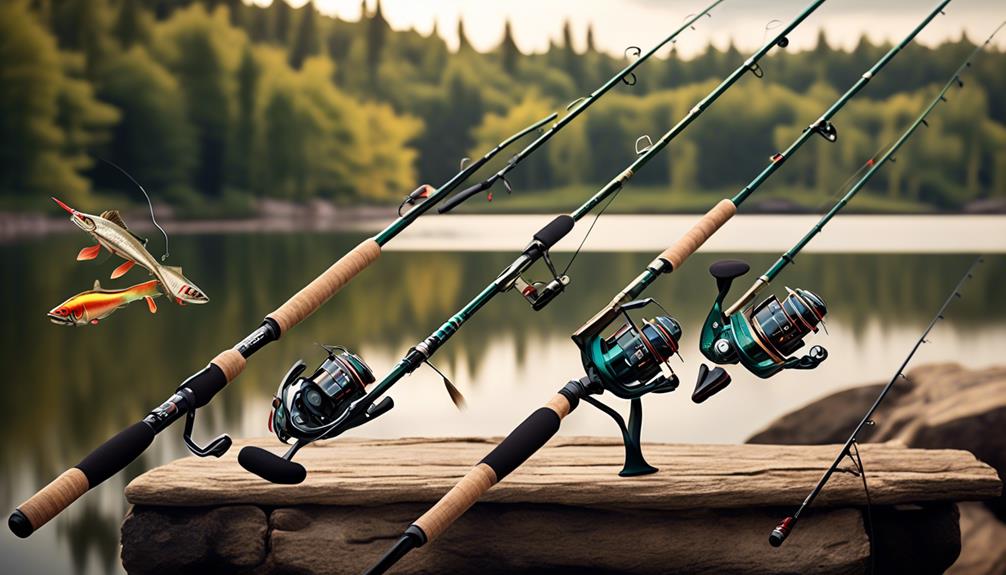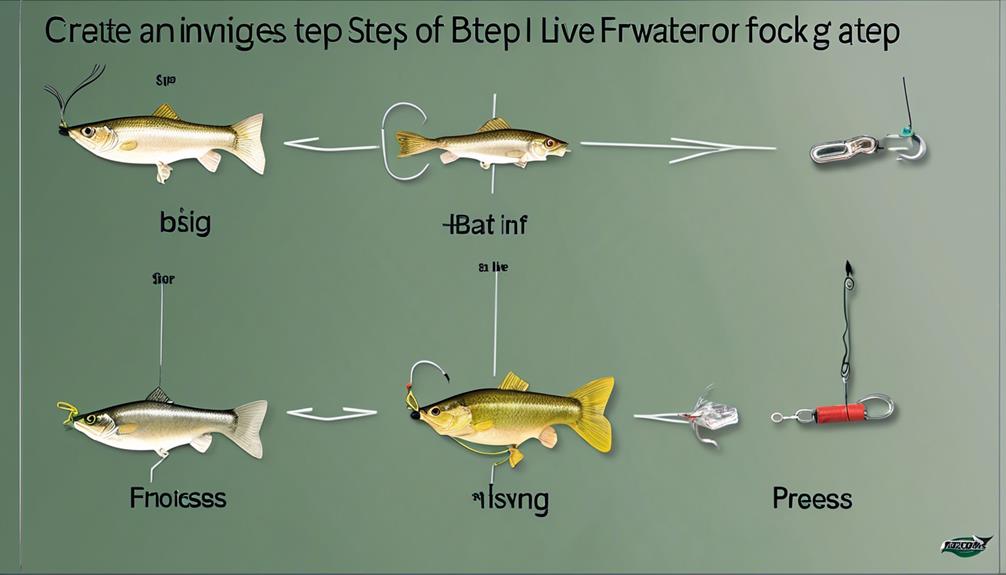When it comes to selecting the ideal freshwater fishing rod, the choices can feel overwhelming at first. You may find yourself torn between different options, unsure of which features will truly enhance your fishing experience. But fear not, as we guide you through the essential factors to consider when making this crucial decision.
From understanding the various types of freshwater fishing rods to matching rod power and action to your fishing style, we'll help you navigate the intricacies of choosing the perfect rod for your freshwater adventures.
By the end of this discussion, you'll have a clear understanding of what to look for in a freshwater fishing rod, ensuring that your next angling excursion is a resounding success.
Understanding Freshwater Fishing Rod Types
When selecting a freshwater fishing rod, it's important to understand the different types available to match your specific fishing needs. The two main factors to consider are rod flexibility and sensitivity, as well as rod construction and durability.
Firstly, let's talk about rod flexibility and sensitivity. Different fishing techniques and fish species require different levels of flexibility and sensitivity in a rod. For example, if you're targeting smaller, more delicate fish, you'll want a rod with greater sensitivity to feel the lightest bites. On the other hand, if you're aiming for larger, more powerful fish, a stiffer and less flexible rod will provide the backbone needed to handle them.
Next, we come to rod construction and durability. The construction of the rod greatly affects its performance and longevity. Graphite rods are known for their sensitivity and lightness, making them great for feeling subtle strikes, while fiberglass rods are more durable and flexible, ideal for handling larger fish and tough conditions. Additionally, pay attention to the number of rod pieces, as a one-piece rod offers superior sensitivity and strength, while a multiple-piece rod provides greater portability.
Understanding these aspects of freshwater fishing rods will help you make an informed choice based on your specific fishing needs. Whether it's the sensitivity for detecting bites or the durability for battling big fish, selecting the right type of rod is crucial for a successful fishing experience.
Factors to Consider When Choosing a Fishing Rod
Consider the type of fish you'll be targeting and the specific fishing techniques you'll be using when choosing a freshwater fishing rod. Different fish species require different rod actions and powers. For instance, if you're targeting smaller fish like trout, a light or ultralight rod would be suitable, whereas for larger fish like bass or pike, a medium to heavy rod would be more appropriate.
Additionally, consider the specific techniques you'll be using, such as casting, trolling, or jigging, and ensure that the rod you choose is suitable for those methods.
Rod sensitivity is another crucial factor to consider. A sensitive rod allows you to feel even the slightest nibbles, resulting in improved hook sets and more successful catches. When evaluating rod sensitivity, pay attention to the material and construction of the rod, as well as the type of guides and reel seat it features.
Furthermore, explore custom rod options if you're looking for a more personalized and tailored fishing experience. Custom rods can be designed to meet your specific preferences, including length, action, power, and even aesthetic elements like handle material and color. While custom rods may come at a higher price point, they offer the advantage of being uniquely suited to your individual fishing style and requirements.
Matching Rod Power and Action to Your Fishing Style
To ensure a successful fishing experience, it's essential to match the power and action of your freshwater fishing rod to your specific fishing style, taking into account the type of fish you'll be targeting and the techniques you'll be using.
When selecting a rod, consider its sensitivity and durability. Rod sensitivity refers to its ability to transmit vibrations from the line to the angler's hand. A more sensitive rod allows you to feel even the slightest nibbles, enhancing your ability to detect bites and react quickly. On the other hand, durability is crucial, especially when targeting larger or stronger fish species. A durable rod can withstand the pressure exerted by these fish, reducing the risk of breakage and ensuring a successful catch.
Additionally, matching the rod power to your fishing style is crucial for achieving the desired casting distance and accuracy. Rod power refers to the amount of force required to bend the rod, with options ranging from ultra-light to heavy. If you prefer finesse techniques or targeting smaller species, an ultra-light to light power rod would be suitable, offering the flexibility needed for delicate presentations.
Conversely, when aiming for larger fish or employing techniques that demand more force, a medium to heavy power rod provides the backbone required for longer casting distances and improved accuracy, especially when dealing with heavier lures or baits.
Evaluating Rod Length and Weight for Freshwater Fishing
Assessing the ideal rod length and weight for your freshwater fishing endeavors is crucial in ensuring optimal performance and efficiency on the water.
When evaluating rod length, consider the type of fishing you'll be doing. Longer rods generally offer greater casting distance, which can be beneficial for covering more water when targeting freshwater species. However, shorter rods provide more precision and control, making them suitable for more confined fishing areas or when targeting smaller fish. Additionally, the rod's sensitivity is influenced by its length, with longer rods often being more sensitive to subtle bites due to the extended leverage.
Rod weight is another critical factor to consider. A lightweight rod offers flexibility and reduces angler fatigue during long fishing sessions. On the other hand, heavier rods provide durability and can handle larger fish species or more challenging fishing conditions. When choosing the rod weight, consider the balance between flexibility and durability based on your fishing preferences and the targeted freshwater species.
Selecting the Right Material for Your Fishing Rod
When choosing the right material for your fishing rod, prioritize considering the specific characteristics and advantages offered by different materials to match your freshwater fishing needs. Choosing the right material for your fishing rod is crucial as it directly impacts the rod's performance, durability, and sensitivity.
Common materials for freshwater fishing rods include graphite, fiberglass, and composite blends. Graphite rods are known for their sensitivity and lightweight feel, making them ideal for detecting subtle bites and fishing for extended periods. Fiberglass rods, on the other hand, are more durable and flexible, making them suitable for handling larger fish and fishing in heavy cover. Composite blends offer a mix of the benefits of both graphite and fiberglass, providing a balanced option for various fishing conditions.
When comparing different rod materials, consider the specific characteristics that align with your fishing style and the type of fish you intend to catch. Graphite rods are excellent for finesse techniques and light to medium action fishing, while fiberglass rods excel in heavy-duty applications and situations where durability is paramount. Composite blends offer versatility, making them suitable for anglers who require a multipurpose rod.
Assessing Handle Design and Grip Comfort
Considering your fishing comfort and control, the handle design and grip comfort of a freshwater fishing rod play a crucial role in enhancing your overall fishing experience. When assessing handle design, it's essential to pay attention to the materials used. Handles are commonly made from cork, EVA foam, or a combination of both.
Cork handles are known for their lightweight and comfortable feel, while EVA foam handles offer durability and a firm grip, especially when wet. The choice between the two largely depends on personal preference, as both materials have their own advantages.
Moreover, grip ergonomics directly impact how comfortable and secure you feel while handling the rod. Look for a handle that fits comfortably in your hand, providing a natural grip that reduces strain during long fishing sessions. Some handles are designed with contours and textures to enhance grip, providing a secure hold even in wet conditions. Additionally, adjustable or customizable handles can offer a tailored grip experience, allowing you to adapt the handle to your specific preferences.
Ultimately, when assessing handle design and grip comfort, it's crucial to consider your own comfort and fishing style. Test out different handle materials and grip designs to find the one that feels most natural and secure in your hand. By prioritizing handle comfort and grip ergonomics, you can ensure a more enjoyable and successful fishing experience.
Exploring Special Features for Freshwater Fishing Rods

To enhance your freshwater fishing experience, it's important to explore the special features available for fishing rods, building on the comfort and grip considerations from the handle design.
Rod sensitivity is a crucial special feature to consider when choosing a freshwater fishing rod. A sensitive rod can detect even the slightest nibble, providing you with better control and increased chances of a successful catch. Look for rods made from high-quality materials like graphite or fiberglass, as they offer superior sensitivity compared to other materials.
Additionally, custom rod options can greatly enhance your fishing experience. Custom rods are tailored to fit your specific fishing style and needs. You can choose the length, action, power, and even the type of guides and reel seat that best suits your preferences. This level of customization ensures that you have a fishing rod perfectly suited to your individual requirements, ultimately improving your performance on the water.
When exploring special features, it's important to consider how these features align with your fishing style and the type of fish you intend to catch. By prioritizing rod sensitivity and exploring custom rod options, you can significantly enhance your freshwater fishing experience.
Budgeting for Your Perfect Freshwater Fishing Rod
If you're an avid angler, carefully allocating your budget for the perfect freshwater fishing rod is essential for maximizing the value of your purchase. When it comes to budgeting for your ideal fishing rod, it's important to consider various factors to ensure you get the best quality within your price range.
Here are some budgeting tips to help you make an informed decision:
- Set a Clear Budget: Determine how much you're willing to spend on a fishing rod and stick to that budget. This will prevent overspending and help you narrow down your options.
- Comparing Rod Prices: Research and compare prices of different fishing rods from various brands. Look for sales or discounts to get the best deal without compromising on quality.
- Consider Long-Term Investment: While it's important to stick to your budget, also consider the long-term investment. A slightly higher initial investment might save you money in the long run by avoiding frequent replacements.
- Evaluate Features vs. Price: Assess the features you need in a fishing rod and compare them with the price. Prioritize essential features that align with your fishing style and preferences.
- Read Reviews: Before making a purchase, read reviews from other anglers to gauge the value and performance of the fishing rod within your budget.
Frequently Asked Questions
What Are the Most Common Mistakes People Make When Choosing a Freshwater Fishing Rod?
When choosing a freshwater fishing rod, common misconceptions include overlooking rod material and underestimating the importance of rod action. Make sure to also consider the proper grip for comfort and control while fishing.
Are There Any Specific Techniques or Fishing Situations Where a Longer or Shorter Rod Would Be More Beneficial?
For casting distance, longer rods work best. In tight spaces, shorter rods are more practical. Consider your fishing environment and technique. Longer rods offer more leverage for hooking and fighting fish, while shorter rods provide easier maneuverability.
How Important Is the Weight of the Rod When Considering Factors Like Casting Distance and Sensitivity?
When choosing a fishing rod, the weight is crucial for casting distance and sensitivity. Lightweight materials like graphite enhance sensitivity, while fast action rods increase casting distance. Consider these factors to find the perfect freshwater fishing rod for you.
What Are Some Advanced Features or Technologies Found in High-End Freshwater Fishing Rods That Are Worth Considering?
When choosing a high-end freshwater fishing rod, consider advanced features like carbon fiber or graphite rod materials for strength and sensitivity. Look for ergonomic handle designs with comfortable grips for extended use.
Can You Provide Tips for Properly Maintaining and Caring for a Freshwater Fishing Rod to Ensure Its Longevity?
To properly maintain your freshwater fishing rod for longevity, ensure proper cleaning, storage, and repair. Regularly clean and dry the rod, store it in a protective case, and address any damages promptly. These care tips will maximize durability.
Conclusion
So, when choosing the perfect freshwater fishing rod, remember to consider the following factors:
- Type: Determine the type of rod that suits your fishing needs, such as spinning, casting, or fly fishing.
- Power: Choose a rod with the appropriate power rating for the size of fish you intend to catch.
- Action: Consider the rod's action, which determines how much the rod bends when pressure is applied.
- Length: Select a rod length that suits your fishing style and the type of water you'll be fishing in.
- Weight: Consider the weight of the rod, as a lighter rod can be more comfortable to use for extended periods.
- Material: Look for a rod made from durable and lightweight materials like graphite or fiberglass.
- Handle design: Choose a handle design that feels comfortable and provides a good grip for casting and reeling.
- Special features: Consider any special features that may enhance your fishing experience, such as built-in bait holders or rod holders.
With the right rod in hand, you can enjoy a more successful and enjoyable fishing experience in your favorite freshwater spots.
Happy fishing!



